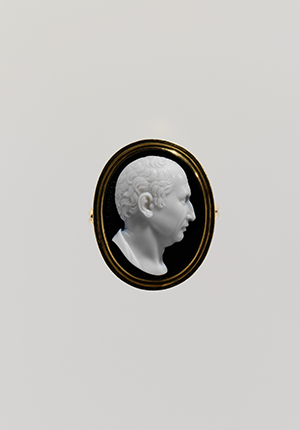Historic Document
De officiis (“On Duties”) (44 BC)
Cicero | 44 BC

The Metropolitan Museum of Art, New York, The Milton Weil Collection, 1940
Summary
Marcus Tullius Cicero (106-43 BC) was the author of De officiis ("On Duties") and a host of other philosophical works, orations, and letters. Although not himself a nobilis, descended from a consul, Cicero had a spectacular career in Rome—as a lawyer, an orator, a consul, and a defender of republican liberty. In pre-revolutionary America, his De officiis, with its argument that honesty is the best policy, and his orations were read in school, generally in the original Latin. It was, however, Cicero’s example as a statesman operating in defense of the republican order, more than his writings, that inspired John Adams and the other members of the Founding generation.
Selected by

Paul Rahe
Professor of History and Charles O. Lee and Louise K. Lee Chair in the Western Heritage at Hillsdale College

Jeffrey Rosen
President and CEO, National Constitution Center

Colleen A. Sheehan
Professor of Politics at the Arizona State University School of Civic and Economic Thought and Leadership
Document Excerpt
De officiis (On Duties), Book 1:
2. Now, among the many important and useful subjects in philosophy that have been discussed by philosophers with precision and fulness of statement, their traditions and precepts concerning the duties of life seem to have the widest scope. Indeed, no part of life, whether in public or in private affairs, abroad or at home, in your personal conduct or your social relations, can be free from the claims of duty; and it is in the observance of duty that lies all the honor of life, in its neglect, all the shame. . . .
4. In the beginning, animals of every species were endowed with the instinct that prompts them to take care of themselves as to life and bodily well-being, to shun whatever threatens to do them harm, and to seek and provide whatever is necessary for subsistence, as food, shelter, and other things of this sort. . . .
But between man and beast there is this essential difference, that the latter, moved by sense alone, adapts himself only to that which is present in place and time, having very little cognizance of the past or the future. Man, on the other hand — because he is possessed of reason, by which he discerns consequences, sees the causes of things, understands the rise and progress of events, compares similar objects, and connects and associates the future with the present — easily takes into view the whole course of life, and provides things necessary for it. Nature too, by virtue of reason, brings man into relations of mutual intercourse and society with his fellow-men; generates in him a special love for his children; prompts him to promote and attend social gatherings and public assemblies; and awakens in him the desire to provide what may suffice for the support and nourishment, not of himself alone, but of his wife, his children, and others whom he holds dear and is bound to protect. This care rouses men’s minds, and makes them more efficient in action. The research and investigation of truth, also, are a special property of man. Thus, when we are free from necessary occupations, we want to see, or hear, or learn something, and regard the knowledge of things either secret or wonderful as essential to our living happily and well. To this desire for seeing the truth is annexed a certain craving for precedence, insomuch that the man well endowed by nature is willing to render obedience to no one, unless to a preceptor, or a teacher, or one who holds a just and legitimate sway for the general good. Hence are derived greatness of mind and contempt for the vicissitudes of human fortune. Nor does it indicate any feeble force of nature and of reason, that of all animals man alone has a sense of order, and decency, and moderation in action and in speech. Thus no other animal feels the beauty, elegance, symmetry, of the things that he sees; while by nature and reason, man, transferring these qualities from the eyes to the mind, considers that much more, even, are beauty, consistency, and order to be preserved in purposes and acts, and takes heed . . . that in all his thoughts and deeds he neither do nor think anything lascivious. From these elements the right, which is the object of our inquiry, is composed and created; and this, even if it be not ennobled in title, yet is honorable, and even if no one praise it, we truly pronounce it in its very nature worthy of all praise.
5. You behold, indeed, my son Marcus, the very form and, as it were, the countenance of the right, which, were it seen by the eyes, as Plato says, would awaken the intensest love of wisdom. But whatever is right springs from one of four sources. It consists either in the perception and skilful treatment of the truth; or in maintaining good-fellowship with men, giving to every one his due, and keeping faith in contracts and promises; or in the greatness and strength of a lofty and unconquered mind; or in the order and measure that constitute moderation and temperance. Although these four are connected and intertwined with one another, yet duties of certain kinds proceed from each of them . . . .
6. Of the four heads into which I have divided the nature and force of the right, the first, which consists in the cognizance of truth, bears the closest relation to human nature. For we are all attracted and drawn to the desire of knowledge and wisdom, in which we deem it admirable to excel, but both an evil and a shame to fail, to be mistaken, to be ignorant, to be deceived. In this quest of knowledge, both natural and right, there are two faults to be shunned, — one, the taking of unknown things for known, and giving our assent to them too hastily, which fault he who wishes to escape (and all ought so to wish) will give time and diligence to reflect on the subjects proposed for his consideration. The other fault is that some bestow too great zeal and too much labor on things obscure and difficult, and at the same time useless. These faults being shunned, whatever labor and care may be bestowed on subjects becoming a virtuous mind and worth knowing, will be justly commended. . . . For the reputation of virtue consists wholly in active life, from which, however, there is often a respite, and frequent opportunities are afforded for returning to the pursuit of knowledge. At the same time mental activity, which never ceases, may retain us, without conscious effort, in meditation on the subjects of our study. But all thought and mental action ought to be occupied either in taking counsel as to the things that are right and that appertain to a good and happy life, or in the pursuit of wisdom and knowledge. I have thus spoken of the first source of duty.
Of the remaining three heads, the principle which constitutes the bond of human society and of a virtual community of life has the widest scope. Of this there are two divisions, — justice, in which consists the greatest lustre of virtue, and which those who possess are termed good; and in close alliance with justice, beneficence, which may also be called benignity or liberality. The first demand of justice is, that no one do harm to another, unless provoked by injury; the next, that one use common possessions as common, private, as belonging to their owners. . . . If any one endeavors to obtain more for himself, he will violate the law of human society. But since, as it has been well said by Plato, we are not born for ourselves alone; since our country claims a part in us, our parents a part, our friends a part; and since, according to the Stoics, whatever the earth bears is created for the use of men, while men were brought into being for the sake of men, that they might do good to one another, — in this matter we ought to follow nature as a guide, to contribute our part to the common good, and by the interchange of kind offices, both in giving and receiving, alike by skill, by labor, and by the resources at our command, to strengthen the social union of men among men. But the foundation of justice is good faith, that is, steadfastness and truth in promises and agreements.




